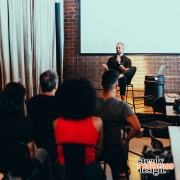How to Have a Successful In-Person Event
It’s been a long year and many live, in-person events have been put on hold due to the pandemic. That doesn’t mean that live events are a thing of the past though. We’re slowly starting to see them come back and we think people are ready to get out of their houses and attend more in-person events! From conferences and workshops to fairs and festivals, we still think it’s definitely possible to have a successful in-person event. We fully support the idea of keeping your business and your community safe, so please keep that in mind before planning an in-person event! Even if it can’t happen now, there’s no better time to start the planning phase than right now!
Having a successful in-person event requires a little more work than a webinar or Zoom event, but they are much more profitable and fun for all involved. Sure, they take a bit of planning, but if you follow these tips you’ll be well on your way.
- Have a Clear Objective – Your first need is to have a clear objective for the event. That is the only way you can successfully market it to your audience as well as potential JV partners and sponsors. People can see when something is well-considered or not.
- Find JV Partners – A joint venture partner (or two or three) can help you pull off a much larger and well-attended event than if you did it all alone. The JV partners should be people who offer complementary products and services to yours rather than direct competitors.
- Hire an Event Planner – The cost of an event planner is more than worth it when you consider all the little things that need to be done to ensure your event goes smoothly. An experienced event planner can actually save you money by helping prevent costly mistakes.
- Recruit Volunteers – Once you know that the event is going to happen and you’ve sold a few tickets, it’s time to recruit some volunteers. The best volunteers are those who have signed up for information about your event but for whatever reason cannot afford to go but fit within your demographic.
- Market Everywhere – Well, market wherever your audience lives, plays, works, and socializes. Your marketing should be directed and specific in order to get a good response. You can have Facebook Live videos, webinars, articles, blog posts, eReports, and more to promote your event. Everyone involved should be promoting the event. Also, consider advertising your event in the local paper or on local radio stations to attract new people who might not find you online.
- Collect Leads – During your marketing, find ways to collect leads because the people you market to via email directly are more likely to sign up for your event than people who find your information in other ways. Consider allowing affiliates to market your event too.
- Land Sponsorships – If you can land a well-known sponsor for your event it will make your event seem even more impressive when you say “sponsored by XYZ Corporation” if that corporation or entity is well known and trusted by your audience.
- Choose the Right Venue – One of the most important decisions you’ll make is where your event will occur. Ensure that the space is right for the size of your event. You don’t want people to feel too crowded, or as if they are swallowed up by the venue. You also want the style of the event to fit in with the style your audience has in terms of them worrying about what to wear and how to present themselves.
- Get Technical Help – Even if you’re great with technology, monitors, computers, microphones, and whatnot you really want someone else to take care of these issues. You want to be a personality at the event, not the technical person because it will take away from some of the fun for you. You’ll have enough things to do as it is.
- Practice the Performance – Your speech, the order of the talks, the use of the technology, and so forth needs to be completed on-site at the event location when possible to avoid any issues with lighting, technology, or even walking up a step or two to get to the podium. This will make you all look more professional and avoid mishaps.
- Test Technology – It’s been mentioned more than once in this list, but that’s how important it is. You should ask speakers to send you a copy of their presentation prior to the event so that if something happens you’ll have a copy, they’ll have a copy, and put a copy in the cloud just in case. But do not assume the internet will work. Have backup plans.
- Allow for Breaks – Don’t forget to put realistic breaks into your event so that your participants do not get too fatigued or uncomfortable. Even interesting talks can put people to sleep if they are uncomfortable, hungry, or need to use the restroom.
- Ensure the Temperature is Comfortable – A very important component of a successful event is how the environment feels to the participants. You don’t want it to be too cold or too warm in the location. If there is an issue, ask it to be fixed on behalf of your guests.
- Serve Healthy Food – It’s tempting to go crazy and serve heavy food that will shock and awe the participants but you really want them to focus on your message and not their full and possibly sick and overfed stomachs. Give options for different types of people. You can survey those who purchased a ticket to ensure the food choice fits most people.
Good planning and plenty of forethought will help ensure a successful in-person event. Not only that, but you’ll be able to create a profitable and fun outing for everyone involved.


